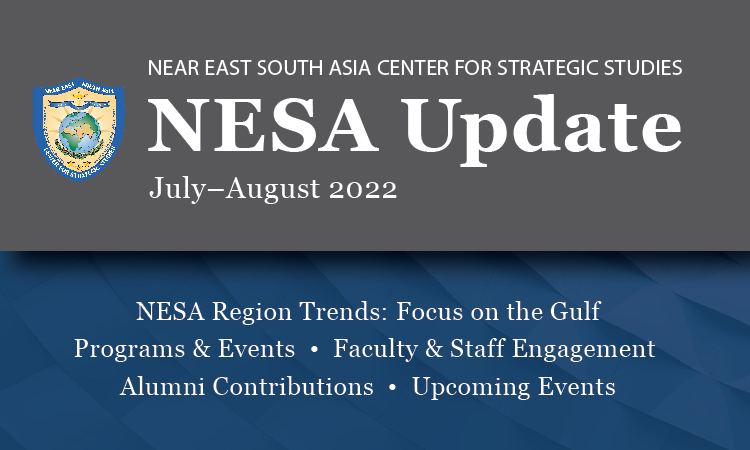July–August 2022 NESA Center Update Report
September 8, 2022 2022-09-08 19:45July–August 2022 NESA Center Update Report
View the NESA Center July–August 2022 Update focused on Near East South Asia Region Trends regarding the Gulf. The update also highlights July through August 2022 NESA Center Programs & Events, Faculty & Staff Engagements, Alumni Contributions, and Upcoming Events.
July–August 2022 Gulf Trends:
- There is great concern over a possible revival of an Iran Deal. Gulf residents do not share the European view that a deal on Iran’s nuclear program will enhance the security of the region. Instead, they feel a possible deal lifting sanctions in exchange for freezing Iran’s nuclear program will grant license for enhanced Iranian proxy action as well as stepped-up missile development. An additional concern is the fear that allowing Iran to legally export oil will undermine the Saudi efforts to keep oil at about $100 a barrel to fund transformation programs. One prominent academic stated he was amazed the U.S. would consider concessions to Iran while it launches attacks against Americans in the U.S. and overseas. The Israeli government has made it clear that it is not satisfied with and will not abide by the nuclear agreement the U.S., Europe, and Iran are negotiating.
- Iran is not standing still, waiting for the U.S., Israel, and some GCC states to isolate it. A NESA Faculty member attended a conference in Doha, sponsored by the Doha Institute, which according to the organizer, was meant to “bring Iran to the Arab world and bring the Arab world to Iran.” The UAE and Kuwait pulled their ambassadors from Tehran after the Saudi embassy was stormed in the wake of the execution of Nimr al-Nimr in 2016. Now six years later, both states have recently returned ambassadors to Iran. In short, Iran is trying to counter U.S. policy and find a way to work with its Arab neighbors, and some of them do not want to put all their eggs in the U.S.-Israeli basket.
- There is enhanced demand for U.S. air and missile defense technology. Gulf partners continue to search for a “field and forget” drone protection system. Once there is a credible drone-killer system, Gulf states will rush to purchase it. The Ukrainian war has done great damage to Russia’s reputation as an exporter of reliable, high-tech military equipment. Gulf partners have come to the view that their only options for missile defenses are American and – to a lesser extent – Israeli. Demand will outstrip American domestic production at current levels. Read more: https://www.mei.edu/publications/we-need-it-yesterday-air-defense-missile-sales-period-maximum-demand
- The widespread belief that the U.S. is leaving the region gains steam. This has been an evergreen since the publication of the 2010 Quadrennial Defense Review and the “Pivot to Asia.” It has picked up pace recently. The sub-optimal Afghanistan withdrawal has done great damage to America’s reputation in the region. America’s apparent inability to have any effect on the chaotic political situation in Baghdad is seen as proof of American disinterest and/or lack of capability to be a credible security guarantor in the region. It is remarkable how uniform this view has become among regionally based security analysts.
- Surprising point of view from Oman. In August 2022, a NESA Center faculty member gave a talk at the Omani MOD and was surprised when an Omani officer questioned U.S. credibility, saying, “How can we trust the U.S. if it changes its policy when a new administration takes office?”
Read the full NESA Update report [PDF]
Read other NESA Center reports here.
The views presented in this article are those of the speaker or author and do not necessarily represent the views of DoD or its components.








